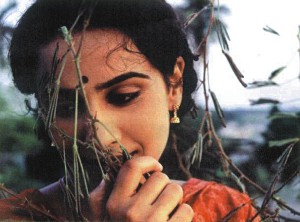Film : Bhalo Theko (Stay well).

Last night I watched the Bengali film Bhalo Theko ( Take Care) directed by a young Director Gautam Halder and starring the debutant and sensuously beautiful young actress Vidya Balan. The film portrays the uncertain years of 1968-1971 in West Bengal India amidst a growing Maoist Naxalite extremist movement involving a lot of young students. The backdrop is a picturesque village on the banks of the river Hooghly. The river and its proximity to the bustling Calcutta port serves as crucial symbolisms in the film. The huge cargo barges on the river passing to and fro and the deep thunderous din of its engines marking the passage of time.
The story is centered around the character of Anandi (the joyous female), the young idealistic daughter of a cultured and politicaly concious conservative Bengali family with strong connections to nature poetry and classical music. The film portrays the interactions of the idealistic, poeticaly sensitive spiritualy conscious character of Anandi with her Uncle, Parents, a loving brother steeped in Marxist extremism, a crassly materialistic sister and a lover who finaly cheats her in his search for materialistic successes.
Through the silent conflicts and the mental burdens thrust upon her by her family Anandi realizes herself as the loving caring spiritualy and poeticaly conscious eternal woman. Her essential innocence, idealism, selfless love and humanity and her deep connection to nature provides her a spiritual conciousness and strength to rise above the selfish materialism which pervades her surroundings. Her strength is her simplicity spontaenity poeticism selfless love and her deep connection to nature traditions and simple humanism.
In sharp contrast with her sister who is glitteringly beutiful yet shallow
and dishonest and Anandis young lover Babua who deserts her when confronted with loneliness and depression abraod where he had travelled under Anandis urging to establish his career . Anandis beauty is her strength, innocence, simplicity, proximity with nature which provides her with an ethereal appeal
an icon of what may be called spiritualy beautiful.
But in the end everyone realizes her for the eternal wellspring of a deep spiritual strength that she was. Her crass and materialistic sister realizes the emptiness of her own life and turns to her for strength and support. Her lover returns to the country after a long and difficult illness and recounts how in his semi comatose mental state of his acute illness the simple yet beautiful face of Anandi burned like a fire in his mind and brings him back from the brink of death. He is now married to another woman but simply says to Anandi that he knew that Anandi would be still waiting for him in the same way and he has come to set her free. And Anandi is ever forgiving and lovable. Her poetic nature can never harbour ill will only a muted sorrow for her loss but with selfless good wishes for both her sister and her deceiving lover.
The film freezes in the end sequence with Anandi beside the flowering and tall KrishnaChura tree resplendent in its red-orange blossoms, a memory of her brother lost and probably dead in his pursuit of Marxist extremism,
reciting a poetry which simply says Bhalo Theko ( Take Care...Stay well)
Stay well grass
The wind and sky
Stay well earth
The river and clouds
Stay Well
Stay well dewdrops
the flowers and bees
Stay well rain
The earth and trees
Stay well
Anandi returns to the source of her eternal spiritual strength; Nature, and in a collective expression of goodwill and selfless love, forgiveness and care for all that is close to her rises above life itself like a beautiful muted and ethereal song of nature, of rain and the leaves of flower and the wind.
The film is wonderful in its poignance, beauty and sensitive humanism. The portrayal of the
eternal woman interpersed with the strong sense of temporal evolution and
the strains of bengali classical music and the Tappas (a genre of bengali songs)
sang by the famous singer Ram Kumar Chattopadhay makes this one a must see.


